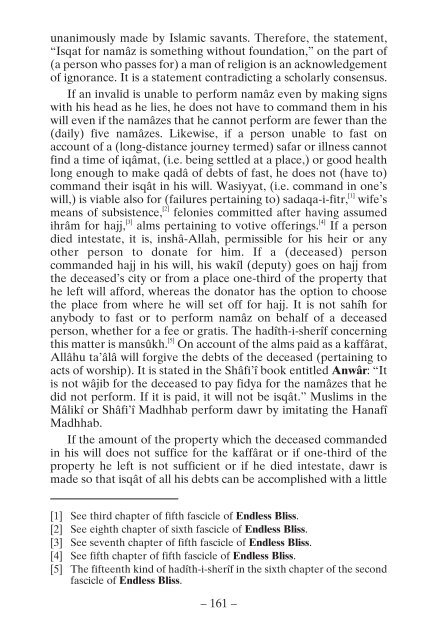Miftah-ul-Janna (Booklet for way to Paradise)
Create successful ePaper yourself
Turn your PDF publications into a flip-book with our unique Google optimized e-Paper software.
unanimously made by Islamic savants. There<strong>for</strong>e, the statement,<br />
“Isqat <strong>for</strong> namâz is something without foundation,” on the part of<br />
(a person who passes <strong>for</strong>) a man of religion is an acknowledgement<br />
of ignorance. It is a statement contradicting a scholarly consensus.<br />
If an invalid is unable <strong>to</strong> per<strong>for</strong>m namâz even by making signs<br />
with his head as he lies, he does not have <strong>to</strong> command them in his<br />
will even if the namâzes that he cannot per<strong>for</strong>m are fewer than the<br />
(daily) five namâzes. Likewise, if a person unable <strong>to</strong> fast on<br />
account of a (long-distance journey termed) safar or illness cannot<br />
find a time of iqâmat, (i.e. being settled at a place,) or good health<br />
long enough <strong>to</strong> make qadâ of debts of fast, he does not (have <strong>to</strong>)<br />
command their isqât in his will. Wasiyyat, (i.e. command in one’s<br />
will,) is viable also <strong>for</strong> (failures pertaining <strong>to</strong>) sadaqa-i-fitr, [1] wife’s<br />
means of subsistence, [2] felonies committed after having assumed<br />
ihrâm <strong>for</strong> hajj, [3] alms pertaining <strong>to</strong> votive offerings. [4] If a person<br />
died intestate, it is, inshâ-Allah, permissible <strong>for</strong> his heir or any<br />
other person <strong>to</strong> donate <strong>for</strong> him. If a (deceased) person<br />
commanded hajj in his will, his wakîl (deputy) goes on hajj from<br />
the deceased’s city or from a place one-third of the property that<br />
he left will af<strong>for</strong>d, whereas the dona<strong>to</strong>r has the option <strong>to</strong> choose<br />
the place from where he will set off <strong>for</strong> hajj. It is not sahîh <strong>for</strong><br />
anybody <strong>to</strong> fast or <strong>to</strong> per<strong>for</strong>m namâz on behalf of a deceased<br />
person, whether <strong>for</strong> a fee or gratis. The hadîth-i-sherîf concerning<br />
this matter is mansûkh. [5] On account of the alms paid as a kaffârat,<br />
Allâhu ta’âlâ will <strong>for</strong>give the debts of the deceased (pertaining <strong>to</strong><br />
acts of worship). It is stated in the Shâfi’î book entitled Anwâr: “It<br />
is not wâjib <strong>for</strong> the deceased <strong>to</strong> pay fidya <strong>for</strong> the namâzes that he<br />
did not per<strong>for</strong>m. If it is paid, it will not be isqât.” Muslims in the<br />
Mâlikî or Shâfi’î Madhhab per<strong>for</strong>m dawr by imitating the Hanafî<br />
Madhhab.<br />
If the amount of the property which the deceased commanded<br />
in his will does not suffice <strong>for</strong> the kaffârat or if one-third of the<br />
property he left is not sufficient or if he died intestate, dawr is<br />
made so that isqât of all his debts can be accomplished with a little<br />
[1] See third chapter of fifth fascicle of Endless Bliss.<br />
[2] See eighth chapter of sixth fascicle of Endless Bliss.<br />
[3] See seventh chapter of fifth fascicle of Endless Bliss.<br />
[4] See fifth chapter of fifth fascicle of Endless Bliss.<br />
[5] The fifteenth kind of hadîth-i-sherîf in the sixth chapter of the second<br />
fascicle of Endless Bliss.<br />
– 161 –

















